Chapter IX Publicity, Training and Academic Activities
1. Publicity
The publicity priorities of 2005 were the national special campaign in protecting IP, formulation of IP strategy and enhancement of innovation. The publicity had new achievements.
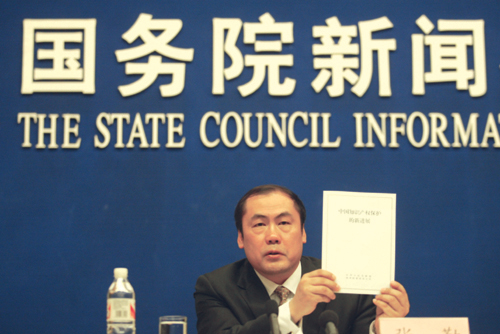
April 21, Deputy Commissioner Zhang Qin answered questions from the
media at the press conference of the State Council information Office.

Joint Media Delegation of Protect Intellectual Property, We are In
Action started the journey.
IP Publicity Week. State Council Vice Premier Wu Yi sent her congratulations for the fifth World IP Day, which significantly encouraged the IP officials and promoted the public understanding of IP knowledge and awareness in IP protection and innovation. The Office organized series of activities for the fifth April 26 World IP Day in the week. The activities included a press conference with other IP administrative agencies and the State Council Information Office and the publication of the White Paper on the Latest Developments of IP Protection in China. On April 26, a joint media campaign, Protect Intellectual Property, We Are in Action, co-sponsored by the Office and the National Office of Rectification and Standardization of Market Economic Order was launched in Beijing. The joint media delegation inclusive of journalists, patent examiners and IP lawyers would begin their interviews in 28 provinces, regions and municipalities covering 40,000 kilometers in the next six months.
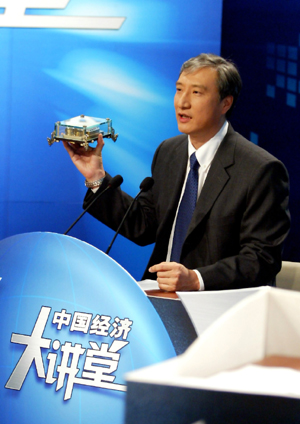
Commissioner Tian Lipu made superb
presentations on TV.
Timely and in-depth publicity on the formulation of the national intellectual property strategy (NIPS) through major party newspapers and Xinhua News Agency. In August, the People's Daily published an interview with Commissioner Tian Lipu titled, Era Calling the NIPS, which described the backdrop, necessity and imminence in formulating the NIPS. People.com.cn and sipo.gov.cn reprinted on their sites immediately. China Intellectual Property News also quickly reported the start of the formulation of the NIPS. In November, China Central Television (CCTV) Economy Classroom repeatedly broadcasted Commissioner Tian Lipu's lecture titled Independent Innovation and IP, which precisely elaborated the relationship between IP and independent innovation, role independently IPRs in promoting an innovative type of country and complete execution of a scientific development outlook. A CCTV channel broadcasted a Chinese patent awards. The Economic News column began broadcasting the theme of Chinese patent information. In December, in response to the so-called garbage patents, the Office with the concern and strong support from the State Council Office and CPC Ministry of Information, demonstrated the differences between garbage patents and questionable patents, origin and preventive measures, making clear of the achievements of the China's IP work by a large number of evidences and timely curbing the spread of unfavorable remarks on China's IP development. At the beginning and the end of the year, the Office worked together with CCTV twice, and jointly broadcasted 2004 Innovative Design Night and 2005 Innovation Gala, both of which were congratulated by Vice Premier Wu Yi. These publicity activities would help the public understand the Chinese IP system correctly and its important meaning to independent innovation and complete execution of a scientific development outlook.
Continued the ongoing projects. The Office continued working with China Daily on the Chinese IP Weekly, IP Edition of the China Marketing News and Knowledge Fortune TV Program, supported the CCTV program Crazy Thinking, organized the activity of Youth Riding with IP. In September, the Office held the 2005 National IP Political Information Meeting in Hulunbeier, Inner Mongolia, summarizing and awarding relevant achievements. In November, the Office organized the media to report on the WIPO High-Level National Seminar on Intellectual Property Education in Foshan, Guangdong.
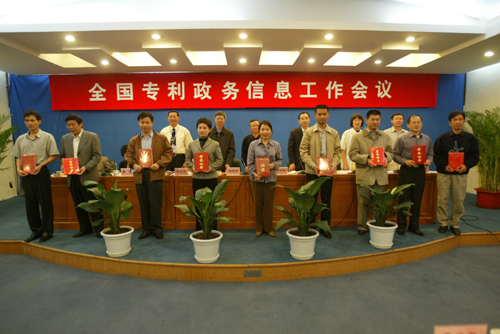
Deputy Commissioner Lin Binghui with winners at National
IP Political Information Meeting.
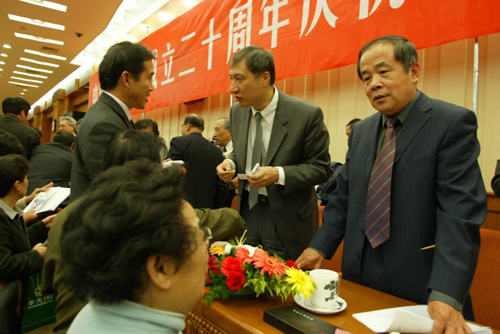
Commissioner Tian Lipu and Deputy Commissioner Xing Shengcai talked
with the participants at the ceremony in celebration of the 20th Anniversary
of theChina Inventions Association.
The Office's website played a special role in publicity. The yearly hits of the site reached 946,710,000, 13.2% increase over 836,290,000 of 2004. The daily hits of the home page were 16,000. The daily patent search hits were 80,000 while 1.1 million pages of descriptions were downloaded. The Office also approved the Plan on the Construction of Government Web Sites of the National IP Office System, which made the Office's site as the main site, the Office's function departments and other provinces, autonomous regions, municipalities' sites as branches. The new web site would ensure the integrity, authority, professionalism and timing of the IP office system's contents.
2.Training
1) Public Training
In an effort to increase the public IP awareness and elevate enterprises' capability in using IP system, the Office intensified IP training in the nation and achieved favorable results.
─ The Office included the IP strategy into training courses for regional city level leaders organized by the CPC Ministry of Organization, targeting vice mayors in charge of science and technology from provinces, autonomous regions, municipalities. It was an effective attempt in promoting IP knowledge among party and political leaders and achieved better results.
─ The Office held training courses on IP strategy for IP administrations of the State Council agencies, introducing the information on the formulation of IP strategy, confirming the objectives and targets of IP strategy and providing useful knowledge for these agencies to draft their parts of the strategy.
─ In response to the shortage of IP tutors in universities and the need of knowledge update of IP professionals, the Office continued working with the Ministry of Education to hold IP training courses for university tutors and researchers.
─ The Office held IP training courses for high tech parks in the nation to promote IP work in the parks and elevate their capability to participate in market competition by using IP system.
─ In an attempt to increase the innovative ability of young people and foster their IP awareness from early age, the Office held a national IP education seminar and tutor training course for elementary and secondary schools, discussing the ideas and methods of IP education in elementary and secondary schools.
The training focuses were centered on the formulation of IP strategy, elevation of independent innovative capability, increase of IP working capability and level. Courses were set up for different training audiences to increase direction and practice, elevate training quality, intensify build-up of elite IP teams. This safeguarded the effects of training.
The IP administrations made full play of their initiatives to hold over 50 different types of training courses. The target audience included party and government leaders, managers of enterprises and organizations and IP tutors. The training further increased the IP awareness of party and government leaders at different level, elevated enterprises' ability in using IP and participation in market competition and foster teams of IP tutors.
2) Training within the Office
In 2005, a series of training in examination, foreign languages, laws, knowledge update and policies were conducted for the Office's staff.
In 2005, the Office held group-training courses for 304 new recruits. Each course lasted four and half months. The training courses were held at the China Intellectual Property Training Center for the first time. Many courses were modified. In the first course of the year, preliminary practice of examination and case study were added. In the second course, search chapter was relocated to the early stage and testing of comprehensive search skills was added.
In an effort to cooperate with the education reform in 2005 and elevate the teaching skills of the Office's adjunct tutors, the second tutor course was held in the training center with one hundred tutors.
The training of leaders was strengthened. Forty-nine director-level leaders were trained. Training included office policies and basic information of official document knowledge, WTO and human resource management.
For a better training method and increase the management skills of the Office's leaders, the Office in cooperation with the School of Public Administration of China Renmin University held a three-week advanced MPA course for 33 director and above leaders. Each participant completed a treatise that would provide helpful proposals to the Office's administration.
Advanced training in foreign languages. The Office selected 14 people to take full-time English courses in Beijing Language and Culture University, which aimed to increase their overall capability in listening, speaking, reading and writing. Courses included legal writing in English, foreign teaching, foreign communication and negotiation.
The Office held 23 foreign language courses in English, Japanese and German for 656 people.
In cooperation with universities or research institutes in the United States, United Kingdom, Japan and Germany, the Office sent talents to study IP law abroad. Some of the American schools were the John Marshall Law School, Franklin Pierce Law Center and Law School of the University of Washington.
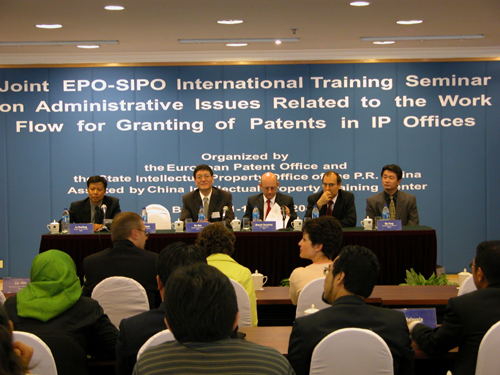
The Office and the European Patent Office jointly organized the Third
International Joint Training Seminar on Administrative Issues.
The Office and the EPO jointly held the Third International Joint Training Seminar on Administrative Issues Related to the Work Flow for Granting of Patents at the China Intellectual Property Training Center. Trainees included 33 examiners from the Office and examiners and patent professionals from 13 countries, namely Croatia, Republic of Korea, DPRK, Cambodia, India, Indonesia, Malaysia, Philippines, Singapore, Thailand, Viet Nam and Egypt.
3) Training Activities of China Intellectual Property Training Center (CIPTC)
In 2005, CIPTC finished 49 training courses of all kinds with nearly 12,000 participants with 45 regular courses, 6,000 trainees and 6,000 in distance learning whose platform was utterly updated. The targeted trainees were mainly officials, heads of companies and entities of key technology fields, engineers. Courses covered patent strategy in key technological areas and IP protection in high-tech areas and application of patent documentation in technological innovation in companies, inviting officials, experts, scholars and IP managers from SIPO, TMO of SAIC, NCA, Chinese Academy of Social Sciences and large companies.
In regard to the education and training of high-level IP professionals, the training center co-organized the sixth graduate course of civil and commercial laws, which was attended by 110 trainees from SIPO, TMO of SAIC, courts of law and IP agencies.
In order to carry out the spirit of the CPC and the State Council leaders, CIPTC implemented a new round of training targeting county directors and educated 2,500 officials from 5 provinces in 2005.
In 2005, CIPTC held seven international IP training courses, continued cooperation with the John Marshall Law School of the United States (JMLS), organized pre-semester training for a new group of officials bound to JMLS, continued cooperation with the International IP Training Institute (IIPTI) of the Republic of Korea considering further interactions. The training center continued management of distance learning program in Chinese of the WIPO Worldwide Academy, with the attendance of 1,300 people. CIPTC received a total of over 60 visitors from the WIPO, EPO, the United States, Mexico, Spain, Viet Nam and the Republic of Korea.
CIPTC upgraded its own IP distance-learning platform in 2005 and launched two series of courses. Two newly added courses, Unfair Competition Law and Patent Representation Practice, were popular among trainees.
CIPTC completed network construction of five classrooms in the year. In 2005, CIPTC was rated a excellent organization in sanitation.
3. Academic Activities
February 2, the China Intellectual Property Society (CIPS) held the IP Strategy Seminar of Chinese and Japanese Enterprises with over 100 attendants.
March 17 to 18, CIPS and Jiangsu IP Society jointly held 2005 China IP Protection Forum in Lianyungang, with 150 attendants. One fourth of them were from coastal customs. The key topics of the Forum were customs IP protection.
April, in connection with April 26 World IP Day, CIPS, Shenzhen IP Administration and Shenzhen IP Society jointly held 2005 IP Practice and Strategy of Chinese Companies in Shenzhen with 200 attendants. Commissioner Tian Lipu made a keynote speech. Professor Zheng Chengsi and other IP experts and scholars lectured on how Chinese companies mastered independent IPRs and elevated their core competitiveness. Good results were achieved.
April 8, CIPS and some IP agencies jointly held a seminar on patent search and analysis and company IP management in Beijing. IP experts and scholars from the United States and Taiwan region made presentations.
May, at the invitation of the American Intellectual Property Law Association (AIPLA) Fareast Branch, CIPS visited the AIPLA and other organizations. The visit achieved its intended purpose.
June 9 to 10, IP Development and Research Center of the Office and Morgan Lewis of the United States jointly held a forum on international IP competition and dispute handling practice at the CIPTC. The forum offered effective strategies for Chinese high-tech companies by utilizing a number of real cases. Many companies attended the meeting which had its intended purpose achieved.
July 15, the new CIPS patent committee was formed and held its first session. The Operation Rules for CIPS Patent Committee was approved and future work was deployed.
September 8 to 11, IP Development and Research Center of the Office held a workshop on experience exchanging in patent strategy promotion project in Changchun, Jilin. The Meeting was welcomed by the local IP administrations and patent strategy project teams.
December 14 to 15, IP Development and Research Center of the Office held a seminar on American IP judicial system and 337-litigation practice. Renowned Judge Charles Bullock of the International Trade Commission and Judge Randall R. Rader of the Court of Appeals of the Federal Circuit delivered presentations. Several experienced American IP lawyers also discussed a variety of issues including how Chinese global-oriented companies in Yangtze Delta and Pearl River Delta dealt with 337 and other IP litigations and achieved the most favorable result. The meeting attracted attention from many domestic and foreign companies and industry associations.
2013-07-17 Print
Print